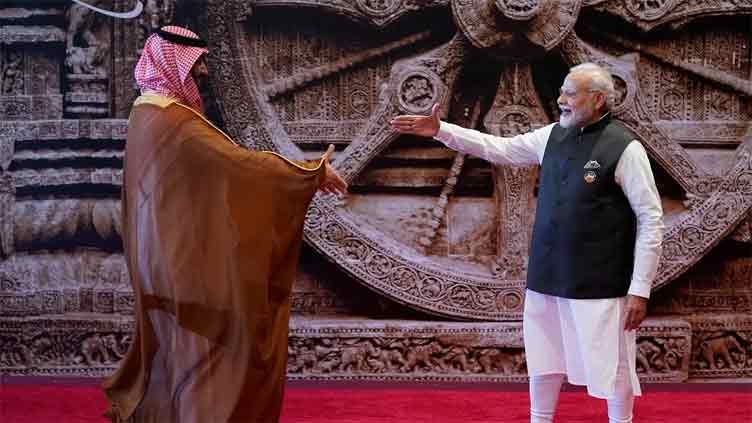India, Saudi Arabia likely to sign energy cooperation pact on Monday

Business
EU, India, Saudi Arabia, UAE, US other G20 partners sign MoU on economic corridor
NEW DELHI (Reuters) – India and Saudi Arabia are likely to sign an energy cooperation memorandum of understanding after a luncheon meeting of Indian Prime Minister Narendra Modi and Saudi Crown Prince Mohammed bin Salman on Monday, a source familiar with the matter said.
The pact will focus on cooperation in energy efficiency, renewable energy, hydrogen and grid interconnection between the countries, the source said.
EXPAND MANDATE OF MULTILATERAL DEVELOPMENT BANKS
There is a need to expand the mandate of multilateral development banks and develop global standards to regulate cryptocurrencies, Modi told G20 leaders during a summit of the bloc on Sunday.
The group of 20 major economies has pledged in a declaration at the New Delhi meeting to strengthen and reform the banks and has accepted a proposal for tighter regulation of cryptocurrencies.
"We need to expand the mandate of multilateral development banks. Our decisions should be immediate and effective in this direction," Modi said during a G20 leaders' session.
HANDED OVER TO BRAZIL
India on Sunday formally handed over the G20 presidency to Brazil at the closing ceremony of the annual summit of the grouping, that was held in New Delhi this weekend.
Modi completed the transition by handing over the gavel of the presidency to Brazil President Luiz Inacio Lula da Silva.
INDIA-MIDDLE EAST-EUROPE ECONOMIC CORRIDOR
Global leaders announced a multinational rail and ports deal linking the Middle East and South Asia on Saturday on the sidelines of the G20 summit in New Delhi.
The pact comes at a critical time as US President Joe Biden seeks to counter China's Belt and Road push on global infrastructure by pitching Washington as an alternative partner and investor for developing countries at the G20 grouping.
Biden said it was a "real big deal" that would bridge ports across two continents and lead to a "more stable, more prosperous and integrated Middle East."
He said at an event announcing the pact that it would unlock "endless opportunities" for clean energy, clean electricity, and laying cable to connect communities.
Modi of summit host India said: "Today, as we embark upon such a big connectivity initiative, we are sowing the seeds for future generations to dream bigger."
The deal will benefit low and middle-income countries in the region, and enable a critical role for the Middle East in global commerce, Jon Finer, the US deputy national security adviser, told reporters at the bloc's annual summit in New Delhi.
It aims to link Middle East countries by railway and connect them to India by port, helping the flow of energy and trade from the Gulf to Europe, US officials have said, by cutting shipping times, costs and fuel use.
A memorandum of understanding on the India-Middle East-Europe Economic Corridor, or IMEC, was signed by the European Union, India, Saudi Arabia, the United Arab Emirates, the US and other G20 partners.
IMEC is envisioned to consist of two separate corridors with an east corridor connecting India to the Arabian Gulf, and a northern corridor connecting the Arabian Gulf with Europe, according to the MOU.
Along the railway route, participants intend to lay cable for power and data lines, as well as pipeline for hydrogen derived from renewable energy for use in power generation.
French President Emmanuel Macron said the pact offers opportunities for manufacturing, innovation and people. "But our intention is to make it real, and to be sure that after this commitment we have concrete results," he said at the event. No immediate details of the value of the deal were available.
The move comes amid US efforts for a broader diplomatic deal in the Middle East that would have Saudi Arabia recognise Israel.
From the US viewpoint, Finer added, the deal helps "turn the temperature down across the region" and "address a conflict where we see it".

